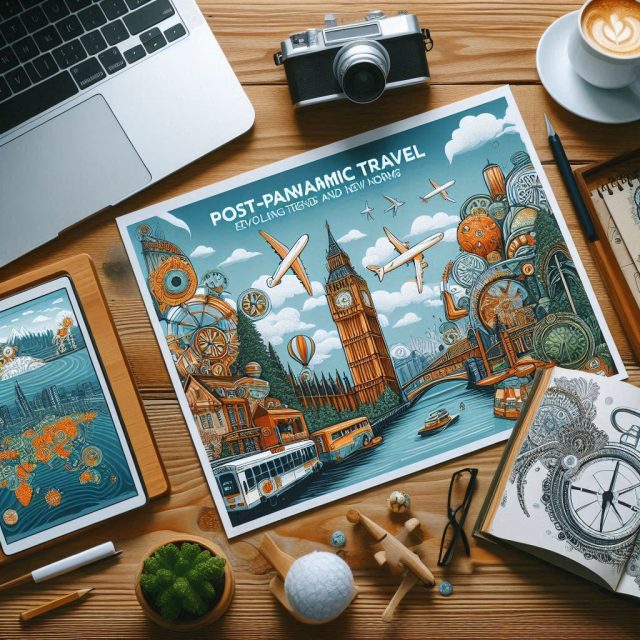The COVID-19 pandemic has had a profound impact on virtually every aspect of life, including the way we travel. As the world begins to recover and adapt to the post-pandemic era, the travel industry is undergoing significant changes. From shifting traveler preferences to new health protocols, the landscape of travel has evolved dramatically. This article explores the emerging trends and new norms in post-pandemic travel, providing insights into how the industry is adapting and what travelers can expect in this transformed environment.
Travel Smart, Stay Safe: Embrace the New Norms.
The Evolution of Traveler Preferences
1. Emphasis on Health and Safety
One of the most significant changes in travel post-pandemic is the heightened focus on health and safety. Travelers are now more conscious of hygiene and cleanliness, and this shift is influencing various aspects of travel:
- Enhanced Sanitization: Hotels, airlines, and other travel-related businesses have implemented rigorous cleaning protocols to ensure safety. Frequent disinfection of high-touch surfaces, use of UV light technology, and improved air filtration systems have become standard practices.
- Health Certifications: Many destinations and travel companies now require health certifications or proof of vaccination. This includes digital health passports that provide a secure way to verify vaccination status and COVID-19 test results.
- Contactless Technology: The adoption of contactless technology has surged. From mobile check-ins and digital boarding passes to contactless payment systems and self-service kiosks, technology is reducing physical contact and enhancing convenience.
2. Shift Towards Domestic and Regional Travel
The pandemic has prompted a shift towards domestic and regional travel. Several factors contribute to this trend:
- Travel Restrictions and Uncertainty: International travel restrictions and evolving quarantine requirements have made domestic travel more appealing. Travelers are opting for nearby destinations to avoid the complexities of crossing borders.
- Support for Local Economies: Many travelers are choosing to explore their own countries or regions as a way to support local businesses and economies that have been hard-hit by the pandemic.
- Safety and Familiarity: Traveling closer to home provides a sense of safety and familiarity, which is particularly important for those still wary of global travel uncertainties.
Safe Journeys Start Here: Prioritize Health, Embrace Adventure.
3. Rise of Outdoor and Nature-Based Tourism
The pandemic has amplified the appeal of outdoor and nature-based tourism. The desire for fresh air, open spaces, and socially distant activities has led to a surge in interest in:
- National Parks and Nature Reserves: Destinations that offer natural beauty and opportunities for outdoor activities, such as hiking, camping, and wildlife viewing, have seen increased demand.
- Adventure Tourism: Activities such as biking, kayaking, and climbing have become popular as travelers seek active and immersive experiences in natural settings.
- Rural and Remote Destinations: Rural and less-crowded destinations are attracting travelers looking for solitude and a break from urban environments.
Changes in Travel Behavior and Preferences
1. Flexibility and Adaptability
Flexibility has become a key consideration for travelers in the post-pandemic era. This shift is reflected in several ways:
- Flexible Booking Policies: Many travel companies now offer more flexible booking and cancellation policies to accommodate changing plans and uncertainties. Refunds, free changes, and extended booking windows have become standard.
- Last-Minute Travel: With uncertainties around travel restrictions and personal health, travelers are increasingly opting for last-minute bookings. The ability to make spontaneous travel decisions is becoming more common.
2. Personalization and Unique Experiences
Travelers are seeking more personalized and unique experiences, driven by a desire for meaningful and memorable trips:
- Customized Itineraries: There is a growing demand for tailored travel experiences that cater to individual preferences, interests, and needs. Travel agencies and tour operators are offering more bespoke services and curated itineraries.
- Authentic Local Experiences: Travelers are prioritizing authentic interactions with local cultures and communities. This includes participating in local traditions, sampling regional cuisine, and staying in locally-owned accommodations.
3. Technology-Driven Travel
Technology continues to play a significant role in shaping travel experiences:
- Travel Apps and Digital Tools: Apps that provide real-time information on travel conditions, health guidelines, and local attractions are becoming essential. Digital tools for itinerary management and local navigation enhance the travel experience.
- Virtual and Augmented Reality: Virtual and augmented reality technologies are being used to offer immersive previews of destinations, helping travelers make informed decisions and enhancing their overall experience.
Evolving Industry Practices and Innovations
1. Sustainable and Responsible Travel
Sustainability has become a central theme in the travel industry, with an increasing focus on responsible travel practices:
- Eco-Friendly Accommodations: Many hotels and resorts are adopting green practices, such as energy-efficient systems, waste reduction programs, and sustainable sourcing.
- Carbon Offset Programs: Travelers are increasingly aware of their carbon footprint and are seeking ways to offset their emissions. Airlines and travel companies are offering carbon offset programs to support environmental initiatives.
- Ethical Tourism: There is a growing emphasis on ethical tourism, which includes respecting local cultures, supporting community-based tourism, and minimizing negative impacts on the environment.
Sustainably Yours: Discover Destinations That Care.
2. Innovation in Transportation
Transportation is undergoing significant changes to meet evolving traveler expectations and environmental concerns:
- Electrification of Transport: The adoption of electric vehicles (EVs) is expanding beyond personal cars to include rental services, shuttle buses, and even electric planes. This shift supports sustainability and reduces carbon emissions.
- High-Speed Rail: Investments in high-speed rail networks are making it easier to travel long distances quickly and efficiently. High-speed trains offer a sustainable alternative to air travel and are becoming increasingly popular.
3. Resilience and Crisis Management
The pandemic has highlighted the importance of resilience and crisis management in the travel industry:
- Crisis Response Plans: Travel companies are developing comprehensive crisis response plans to handle future disruptions. This includes health and safety protocols, contingency plans, and communication strategies.
- Traveler Support Services: Enhanced support services for travelers, such as 24/7 helplines and emergency assistance, are becoming standard to ensure travelers’ safety and well-being during unexpected events.
The Future of Post-Pandemic Travel
As we look to the future, several key trends are likely to shape the travel industry:
1. Continued Emphasis on Health and Safety
Health and safety will remain a top priority for travelers and the industry. The integration of advanced health technologies, ongoing sanitation measures, and transparent communication will continue to be essential.
2. Integration of Technology
The role of technology in travel will continue to grow, with advancements in artificial intelligence, virtual reality, and mobile applications enhancing the travel experience. Technology will also play a crucial role in streamlining processes and improving efficiency.
3. Focus on Sustainability
Sustainability will remain a significant focus, with travelers increasingly seeking eco-friendly options and travel companies adopting greener practices. The push towards responsible tourism will shape how destinations and businesses operate.
4. Evolution of Travel Norms
Travel norms will continue to evolve, influenced by changing preferences, technological advancements, and global events. Flexibility, personalization, and unique experiences will define the future of travel.
Conclusion
The post-pandemic travel landscape is marked by significant changes and adaptations driven by health concerns, shifting traveler preferences, and emerging trends. As the world continues to recover and evolve, the travel industry is embracing new norms and innovations to meet the demands of modern travelers. From enhanced health and safety measures to a focus on sustainability and technology, the future of travel promises to be dynamic and transformative. As travelers navigate this new era, they can expect a blend of familiar comforts and exciting new experiences, shaping the way we explore the world in the years to come.






